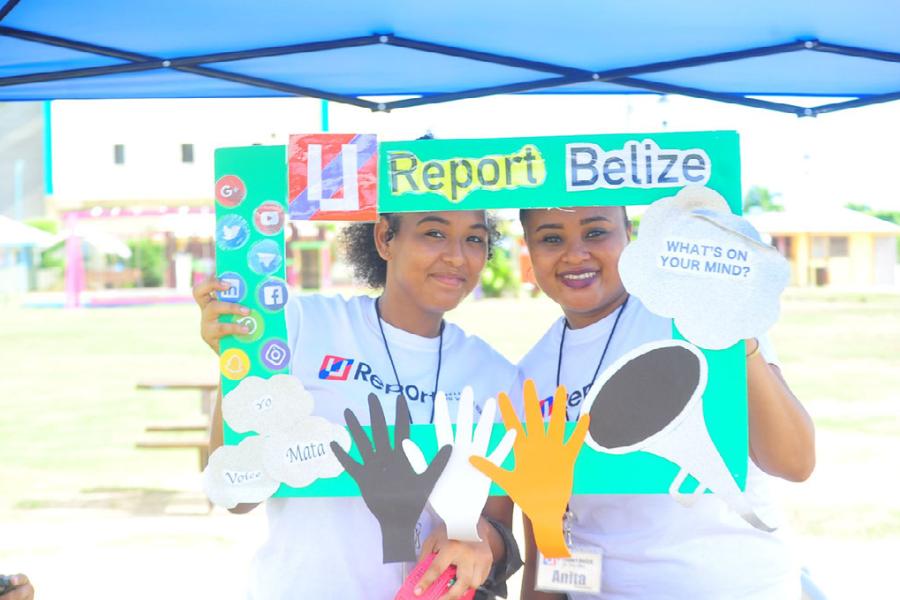Belize - Adolescent Health Digest

What's hot and what's not in Adolescent Health News from UNICEF Belize.
In Belize, adolescents aged 10-19 account for 22% of the total population (88,832) so their health is a really important determinant of national health, stability and potential. The health of adolescents is itself dependent on many factors reaching far beyond the health sector. Improving adolescent health therefore requires an understanding of the underlying determinants or drivers and threats to adolescent health as well as strong multi-sectoral collaboration and broad adolescent engagement and community support for social and behavioural change. This comprehensive, multisectoral approach to improving health of adolescents is reflected in our programming in Belize.
In a meeting in July 2017, UNICEF together with stakeholders, including adolescents from around the country, developed the following Conceptual Model of Actions for Adolescents in Belize. (Fig 1)
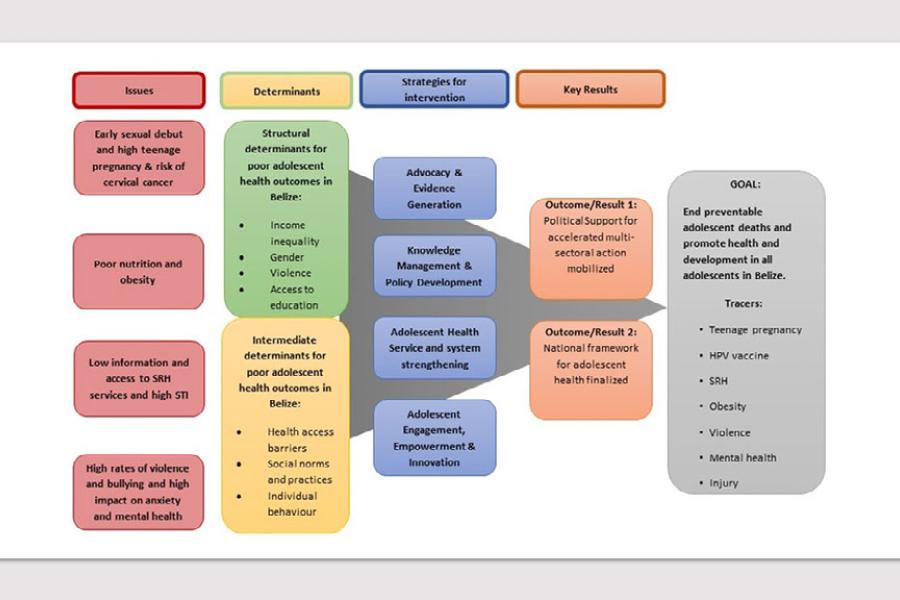
Since UNICEF Belize adopted this framework for our action on adolescents last year, these are some of the key results we have supported or continue to work towards in Belize under each of the strategic intervention areas.
1. ADVOCACY AND EVIDENCE GENERATION:
Menstrual Hygiene Management Study: UNICEF and the WASH multi-sectoral technical working group in Belize completed the Menstrual Hygiene Management Study. The goals of the Menstrual Hygiene Management (MHM) Study were to (1) provide key recommendations for planning and development of effective country-specific MHM interventions and monitoring and evaluation (2) develop an integrative approach to MHM to incorporate it as part of existing opportunities such as WASH, sexual reproductive health, HFLE curriculum and (3) inform the design of an advocacy campaign for key programme implementers and decision-makers. The study was launched on December 11, 2018 in Belize.
In September 2018, UNICEF, PAHO and the Ministry of Health jointly hosted an Open House on adolescent health with a focus on mental health in Belize. This event was organized as an informal “Town Hall” forum for the exchange of information and ideas and to allow for the public to engage with experts in a conversation on adolescent mental health. Awareness and understanding of the adolescent mental health issues were increased among partners and stakeholders from the government, NGOs/CSOs, academia and media. One of the speakers at the event, Dr Mung from PAHO, presented an eye-opening overview on the prevalence of non-communicable diseases (NCDs) including mental health in the general population globally and regionally, the preventable nature of NCDs and he highlighted the urgent need for support in building coping and interpersonal skills and resilience in adolescents, particularly given the growing disconnect and impact of digital technology in adolescent relationships. Alejandra Trossero, UNICEF regional Adolescent Advisor, presented an overview of adolescent health data in the Latin American and Caribbean region, pointing out the high burden that violence, mental health, road injuries and teenage pregnancy have on health and survival in adolescents. Nurse Bennett, Head of Mental Health Programming in the Ministry of Health, presented data on mental health in Belize showing a surprisingly high level of attempted suicide among adolescents in Belize and reinforcing Dr Mung's call for urgent action to put measures for better care, guidance and support in place for adolescents. Dr Debra Jackson, Chief of Implementation Science at UNICEF, the final speaker at the event, provided encouraging information on how implementation science studies can be designed to provide rapid answers to critical questions such as what approaches can be effective in improving mental health literacy at scale in adolescents.
Obesity: UNICEF is working with National Sustainable School Feeding Technical Committee (NSSFTC), including Ministries of Health, Education, Agriculture, Human Development and PAHO to support nutrition-specific coordination at the national levels and develop a strategy to address nutrition problems, including a specific objective of reducing overweight and obesity. UNICEF will work with PAHO to undertake a review of policies, regulations and strategic planning documents that are relevant to understand how the political framework is conducive to an enabling environment for the prevention of overweight and obesity through adequate nutrition in early childhood, and use of safe, nutritious, diversified and culturally-acceptable foods for all Belizeans. In addition to the desk review, a participatory KAP study is planned to enquire about the social norms and cultural attitudes related to nutrition and dietary patterns, physical activity and overweight and obesity in children and families through a MICS Plus study in 2019. MICS Plus is a new module of the Multiple Indicator Cluster survey that will be tested in Belize in 2019. This module will feature longitudinal follow up of a sub-sample of households and respondents in order to generate additional data to help understand the underlying drivers for key concerns or observations identified through the cross-sectional data gathered through the standard MICS household survey.
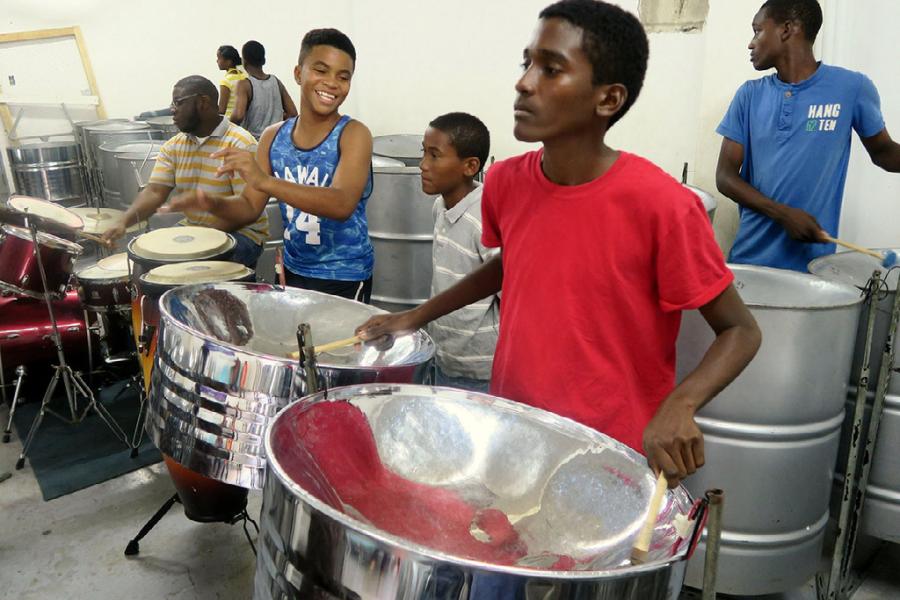
Community Gang Assessment: In October this year, together with the Inter-American Development Bank (IDB) and the Ministry of Human Development, and Social Transformation and Poverty Alleviation (MHDSTPA), UNICEF supported a validation meeting to review findings from a Community Gang Assessment. The assessment provides information on the level and extent of gang activity in Belize City, its impact on all sectors of the community, and risk factors specific to adolescents and young people’s involvement in gangs in Belize City across a variety of data domains. The assessment has recommended that a risk assessment for gang involvement be included in the standard assessment for adolescent clients seen in health facilities in gang affected communities, as part of the normal intake standard, as a proactive preventive measure and to facilitate early intervention.
2. KNOWLEDGE MANAGEMENT AND POLICY DEVELOPMENT:
UNICEF has supported development of the National Adolescent Health Strategic Plan including a comprehensive situational analysis of adolescent boys and girls. Following participation in a UNICEF/UNFPA/Belize Family Life Association (BFLA) Regional Adolescent Health workshop for the Caribbean, the three agencies along with PAHO, have supported the government to define a national roadmap for development of a national strategy building on the global guidelines Accelerating Action for Health of Adolescents (AA-HA!). AA-HA! Guidance emphasizes the inputs from adolescents and multi-stakeholder participation. The process includes completion of a needs assessment, landscape analysis, evidence-informed prioritization and selection of interventions for strategic programme response. In the context of this ongoing work, multiple priorities have been identified, including mental health, obesity, violence and injury prevention, sexual reproductive health and positive development, based on their relative contribution to health and wellbeing in adolescents in the country. The development process enabled a systematic collaborative effort to commit to strengthening service delivery on adolescent health. Also, through the development of the national strategy, existing data has been disaggregated for adolescents aged 10-14 and 15-19. Disaggregated data on key indicators for these themes are now summarized in adolescent health fact sheets, which are used as the evidence-base by the adolescent health Technical Working Group (TWG), comprised of adolescents and services providers - to support the strategic analysis and planning process. Specific adolescent health priorities have now been identified for each district of Belize, based on the disaggregated data by geographic locations.
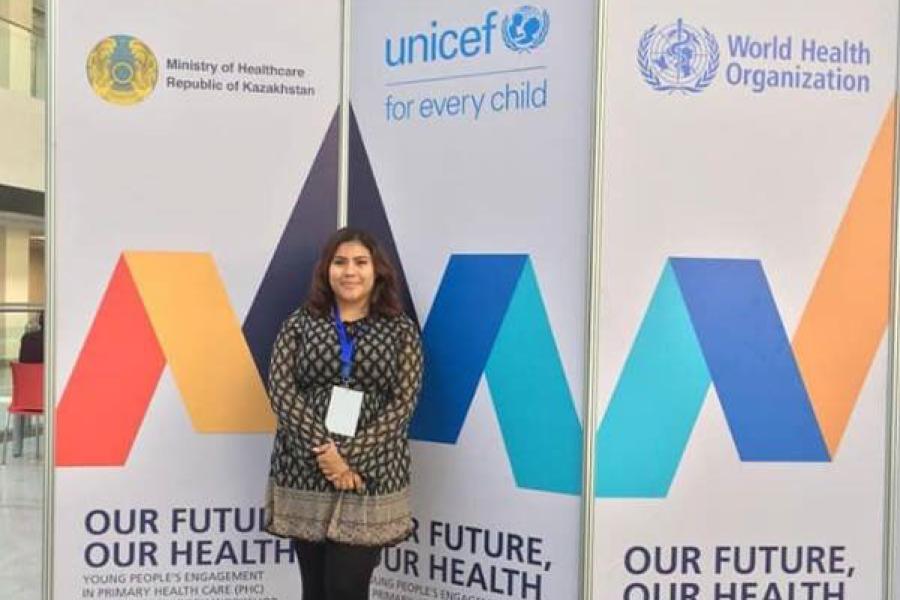
Adolescents and Primary Health Care: In preparation for the global Primary Health Care Conference in Kazakhstan in October 2018, UNICEF supported adolescent consultations in Belize to gather information on their knowledge, views and experiences in accessing primary health care services in Belize. UNICEF Belize worked with the Department of Youth Services and Ministry of Health and reached out for information using both digital tools (surveys via U-Report and WhatsApp) and face-to-face focus group discussions. The findings from adolescents in Belize were presented by Belize's adolescent delegate to the global conference, Ms Abbie Godoy, and they contributed to a global report on adolescents and primary health care that was used to inform the advocacy and outcome document from the global conference.
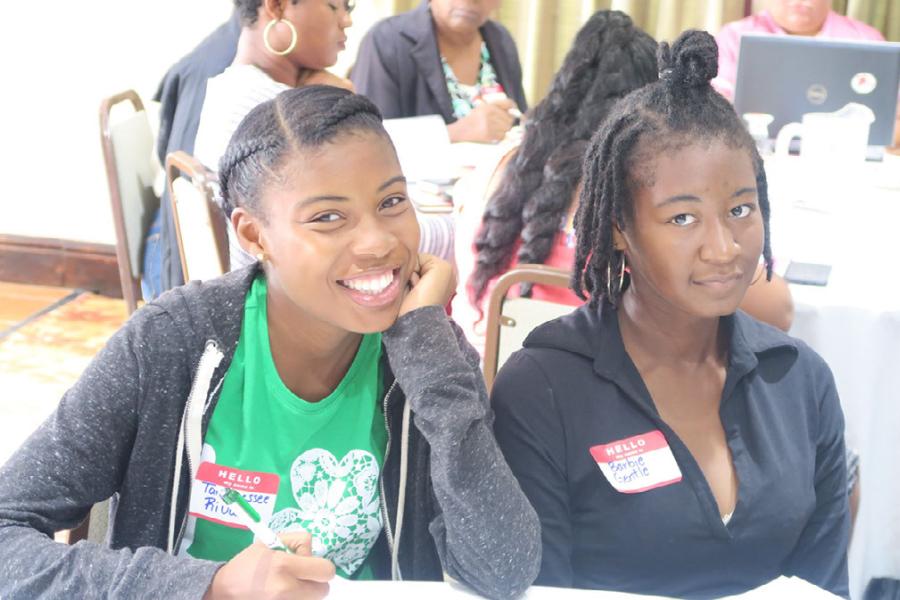
Child Marriage and Early Unions: UNICEF, UNFPA, the Central America and Mexico Youth Fund (CAMY Fund), and the National Committee for Families and Children (NCFC) held a two-day workshop from September 26 to 27 in Belize City. In Belize, parents can consent to a child getting married at the age of 16 years and the 2015/6 MICS survey found that The workshop aimed to strengthen understanding in a broad range of stakeholders, around the problem of Child Marriage and Early Unions and to develop a Road Map with key strategies for preventing and addressing Child Marriage and Early Unions in Belize. Representatives from civil society, the media, academia, faith-based organizations, the judiciary and various adolescent groups participated in the workshop.
3. ADOLESCENT HEALTH SERVICE AND SYSTEM STRENGTHENING
According to the Belize Health Information System which captures data on conditions for which care is sought by clients and the care provided, nationwide, mental health is a growing cause of illness in adolescents, particularly older adolescents. Between 2014 and 2016, the attempted suicide rate among adolescents 15-19 increased annually by 39% and by 2017, the rate had nearly tripled from 2014 levels. (Fig 2). Adolescents aged 15 - 19 years have the highest rates of attempted suicides compared with any age group in Belize (Fig. 3). Human resources for mental health in Belize are severely limited and this affects timeliness, accessibility and effectiveness of mental health care and support. Most people are unable to receive even the basic information or support on mental health and specialized more intensive support is costly and largely inaccessible.
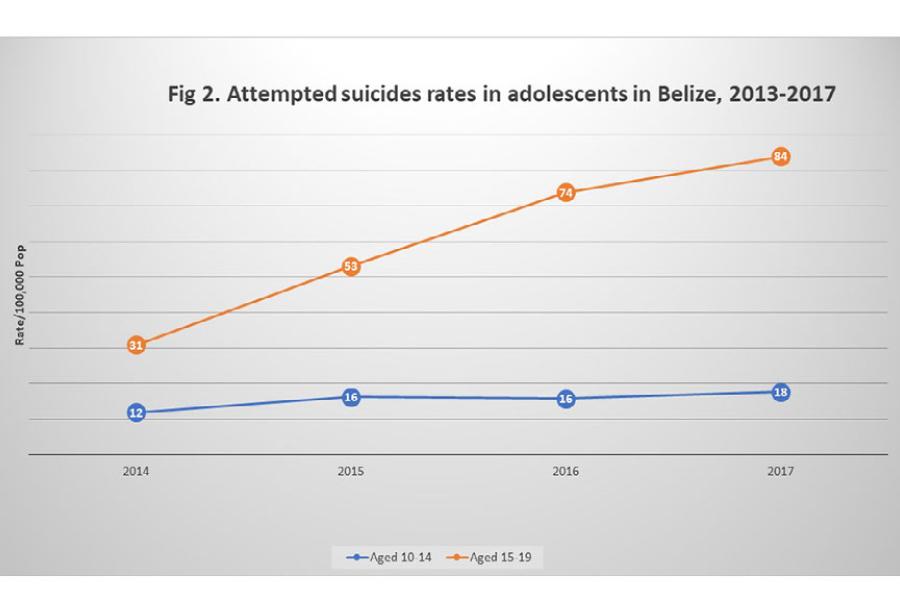
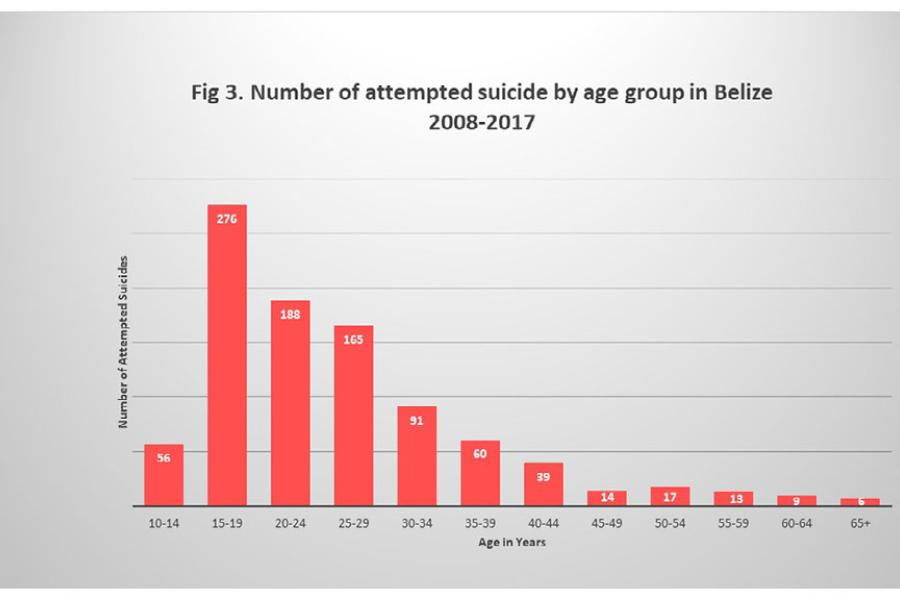
Mapping exercise for mental health services: With technical support from UNICEF, an on-going mapping exercise is being conducted through an online survey using the “4Ws” tool to provide baseline information on adolescent mental health. The survey identifies a number of agencies that have been working on providing mental health services/social support to adolescents. This exercise was identified in a meeting between UNICEF and the Ministries of Health and Human Development to be a necessary first step to enable strengthened coordination and partnership among government sectors (human development, education and health) and better optimization of resource use. The mapping exercise will define the questions and scope for an implementation research study to address specific questions on implementation and inform further guidance on adolescent mental health. A Knowledge, Attitude and Practice (KAP) study for adolescents in school is planned for 2019, using mental health-related indicators in the Global School Health Survey, together with other standard measurement tools to measure the prevalence of mental disorders among adolescents in school. The KAP study will be conducted through a pilot of MICS plus, as a real-time monitoring of the social norms and cultural attitudes related to mental health.
Norms and standards for adolescent health services: The Ministry of Health has initiated work to define norms and standards of care for adolescents and a December 2018 meeting between the Ministry of Health, PAHO, UNICEF and UNFPA reviewed available global guidance on quality standards and a detailed job aid for health care workers that can be used to adapt and accelerate the development of these resources to strengthen health service delivery for adolescents in Belize. Psychosocial assessment is suggested to be included in the norms and standards towards creating an adolescent health care plan. The assessment will ensure immediate follow-up with adolescents at risk, for improved support for mental health. Following the completion of the national adolescent health strategy and adaptation of the norms and standards for adolescent health care in 2019, the Ministry of Health will pilot the delivery and evaluate the effectiveness of routine adolescent health check-ups, including psychosocial assessment.
Innovation in health service delivery on mental health: Given the significant human resource constraints for complex mental health care and the urgent need for mental health information and basic support for adolescents, UNICEF and the Ministries of Health, Education and Human Development, along with PAHO and UNFPA will collaborate to disseminate age-appropriate information on mental health to adolescents to respond to the high rates of anxiety, stress, substance abuse and suicide ideation. The partnership aims to better inform and empower adolescents, providing them with information on adolescent development, coping strategies, and available sources for support. UNICEF has also committed to support the Ministry of Health in exploring options to improve mental health service delivery for adolescents (building mental health literacy, access to counseling, and referral) using digital health tools/U-Report.
Positive parenting to address adolescent mental health: UNICEF Belize and the National Committee for Families and Children and the Ministry of Human Development, Social Transformation & Poverty Alleviation launched the Art of Parenting on the World Children's Day. The Parenting Guide and Summary Document were developed to support results in the "parenting pillar" of the multisectoral strategy on ECD and Lifelong Learning. The parenting guide intends to harmonize and ensure quality of information on child development at the different stages of childhood in order to inform and empower parents and health, education and social workers as they attempt to provide more effective guidance and support to children of all ages. The Parenting Guide covers multiple concerns commonly affecting children in the adolescent phase and includes information on early detection of anxiety and depression in adolescents as well as suggestions for effective communication, care and support.
4. ADOLESCENT EMPOWERMENT, ENGAGEMENT AND INNOVATION
Over the past four years, the Ministry of Labor, Local Government and Rural Development (MLLRD), the Mayor’s Association, UNDP, UNICEF and the NCFC, have been supporting municipal authorities to strengthen child and adolescent participation in local governance. Children's Advisory Bodies (CABs) have been established in every municipality in Belize with children working hand-in-hand with local government officials to identify those key issues that would impact the delivery of results for children and provide some recommended actions to overcome them. The CABs are now a central feature of Belize's Sustainable and Child Friendly Municipalities Initiative and by ensuring systematic participation of and consultation with children on all matters concerning them, the CABs and the SCFM are enabling local governments across Belize to realize the results in their strategic plans, as well as, the multisectoral results in Belize's Children’s Agenda 2017-2030.
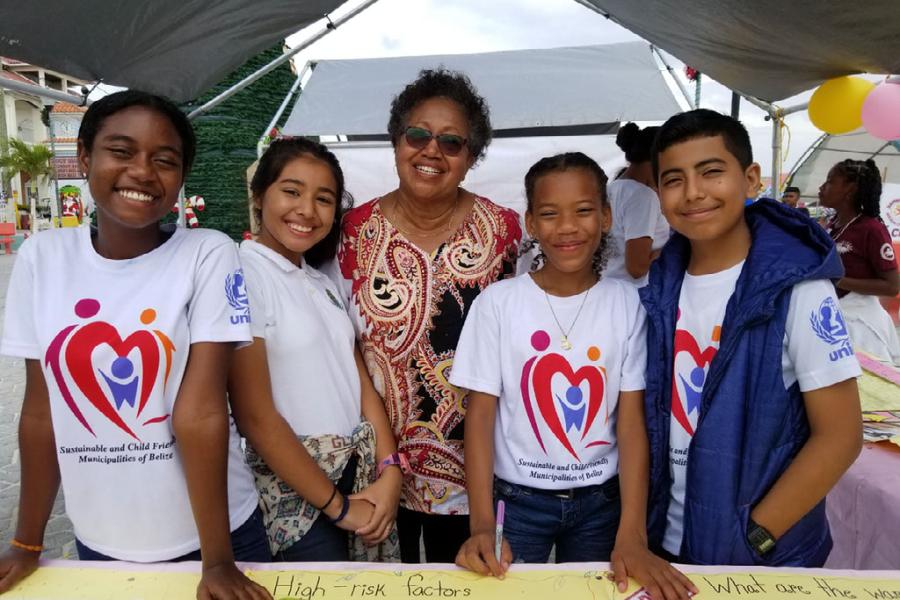
U-Report: In September 2018, UNICEF launched the U-Report Belize, a platform together with the National Committee for Families & Children (NCFC), Department of Youth Services (DYS), Ministry of Labour, Local Government (MLLG), Belize Telemedia Limited (BTL), SMART Belize and partners from a range of programmes and sectors. U-Report enables rapid real-time data collection, information dissemination that can support health literacy, as well as engagement and support through the unique U-Partner function. U-Partner operates like a dedicated hotline and enables delivery of scheduled, confidential and quality-assured one-on-one counseling via mobile phone. Currently, over 1750 U-Reporters have been registered in Belize (48% males and 52% females). Multiple polls have been conducted and results and basic information disseminated through U-Report and WhatsApp, including topics such as hand washing, mosquito-transmitted diseases, H1N1 and health-seeking behaviors.
